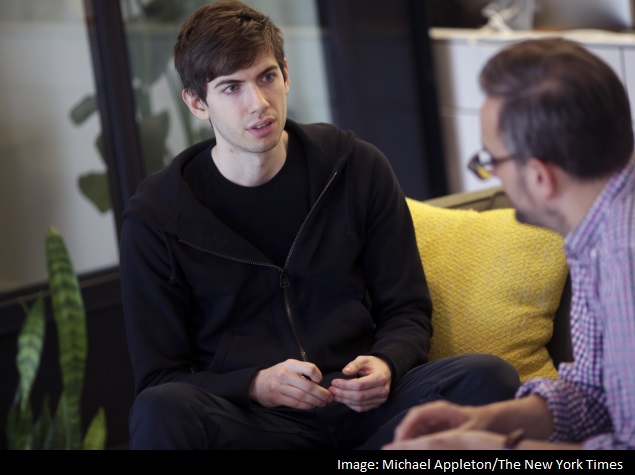- Home
- Internet
- Internet News
- No Regrets for Tumblr Founder a Year After Yahoo Sale
No Regrets for Tumblr Founder a Year After Yahoo Sale

So far, the worst fears have begun to dissipate. Tumblr, a microblogging platform, has more than doubled its staff to 220, and its audience continues to grow, up 22 percent in the last year, to 40 million visitors a month, according to the metrics company comScore.
"The most terrifying thing to me was that this would change the company in any way," David Karp, Tumblr's founder and chief executive, said in a recent interview. "But almost a year in, they have lived up to everything they promised."
Still, the coupling has not yet solved the major issue that has long stumped Karp and Tumblr: How to generate significant revenue growth from the service.
"The stakes are as high as they've ever been," said Karp, 27. He said the pressure was not coming from the "mother ship," but from "proving that we can be a great, great business."
Some people, including former employees of Tumblr, still question whether Tumblr should have sold itself when it did. And many of the company's early and well-known employees left it not long after the acquisition, raising questions about what internal turmoil might be roiling beneath the company's surface.
There is no question, though, that Yahoo's size has given Karp and Tumblr some extra time to find a working business model. But Yahoo investors will probably not wait forever, and at some point, Mayer and Karp will have to answer for the big purchase.
Tumblr, founded in 2007, has built a dedicated base of users and carved out a unique niche for itself as a visually rich blogging platform within the social Web landscape dominated by Facebook, Instagram and Twitter.
Karp wanted to keep hold of that niche and the site's identity, and in the deal with Yahoo, he successfully pushed for Tumblr to remain largely independent.
Yahoo has happily offered its advice, support and technical infrastructure, as well as money, Karp said, but Tumblr has maintained its autonomy.
"We're our own shop. We have our own leadership, and we're doing things our own way," he said.
Andrew Frank, an analyst at Gartner, a research company, said the independence has seemed to work smoothly so far. While Yahoo is funneling resources to the business, he said, Yahoo has not forced any major changes that could damage the service.
"Most of the initial fears have been allayed, at least as far as the audience goes," Frank said. "It's gone as well as it could be expected."
Lee Brown, Tumblr's head of global advertising sales, who worked at Yahoo a decade ago, when the company snapped up services like GeoCities, says life under Yahoo has gone well.
"The leadership here is completely different," he said. "It's a different vibe, atmosphere, and we have a lot of opportunity to grow our business in many ways."
Brown is leading the charge at Tumblr to figure out how to make money
from the company's sizable audience and network of 180 million blogs that are published on Tumblr's platform.But rather than slap banner ads on those Tumblr blogs and risk a mutiny from users, he said, the company is working with advertisers to encourage them to create their own Tumblr pages and come up with creative material - also known as native advertising - that fans can interact with.
Those branded blogs, however, don't make money for Tumblr. The goal is to get brands to understand the appeal of Tumblr and then pay for premium placement on Tumblr's products.
Some new products that are meant to make money, including advertiser posts that can be aimed at specific demographics, have also been introduced. Tumblr uses Yahoo's ad-serving tech to try to target people by their location and gender. Brown declined to say whether the company was generating more revenue than a year ago.
Mark Coatney, who managed Tumblr's media and business partnerships for three years until he left last summer, said marketers still saw Tumblr as an experiment, and a bit more immature than social media sites like Facebook and Pinterest.
"Tumblr doesn't get the same amount of traffic as some other sites, and the ask is bigger," he said in a recent interview, referring to the amount of work a potential brand partner has to do to build out its Tumblr presence, compared with setting up a Twitter or Facebook social media account.
He also said Tumblr could be a hard sell to marketers, who like knowing whom they are directing their ads at. This is tricky on Tumblr, because the service does not require people to give more than an email when they sign up for an account. "Real-world identities are valuable to advertisers," Coatney said. "Tumblr doesn't have that."
Although many of those advertising questions remain, Karp said he remained far more focused on the user experience and keeping the service fresh and interesting for its young user base.
Tumblr's look and design have remained roughly the same for most of its life, and the company has no immediate plans to change it, he said. The company is working on new features for its mobile product, which he expects to introduce soon, although he did not say when.
"Mobile came later for us, and we haven't gone anywhere, creative-wise, with what we can do with these devices," Karp said.
John Maloney, who ran daily operations at Tumblr as its president from 2008 until he left in 2012, said the startup had changed even before the Yahoo deal. He said Tumblr struggled to retain its indie mentality internally when the company began to expand rapidly, adding employees and raising $125 million in a round of venture financing.
"I think the company could be worth three or five times as much today" as when it was sold to Yahoo, said Maloney, who said he had stepped down because of internal pressures. He added: "I would have liked to see how far David could have taken it on his own."
Karp said he had no regrets. The biggest challenge for Tumblr is retaining its creative and independent culture as it grows "from a team of a hundred to hundreds," which is presenting more of a challenge than working with Yahoo, he said.
"I was terrified going into it," he said. "But now I am thrilled. We are incredibly happy and productive."
© 2014 New York Times News Service
For details of the latest launches and news from Samsung, Xiaomi, Realme, OnePlus, Oppo and other companies at the Mobile World Congress in Barcelona, visit our MWC 2026 hub.
Related Stories
- Samsung Galaxy Unpacked 2026
- iPhone 17 Pro Max
- ChatGPT
- iOS 26
- Laptop Under 50000
- Smartwatch Under 10000
- Apple Vision Pro
- Oneplus 12
- OnePlus Nord CE 3 Lite 5G
- iPhone 13
- Xiaomi 14 Pro
- Oppo Find N3
- Tecno Spark Go (2023)
- Realme V30
- Best Phones Under 25000
- Samsung Galaxy S24 Series
- Cryptocurrency
- iQoo 12
- Samsung Galaxy S24 Ultra
- Giottus
- Samsung Galaxy Z Flip 5
- Apple 'Scary Fast'
- Housefull 5
- GoPro Hero 12 Black Review
- Invincible Season 2
- JioGlass
- HD Ready TV
- Latest Mobile Phones
- Compare Phones
- Apple iPhone 17e
- AI+ Pulse 2
- Motorola Razr Fold
- Honor Magic V6
- Leica Leitzphone
- Samsung Galaxy S26+
- Samsung Galaxy S26 Ultra
- Samsung Galaxy S26
- MacBook Pro 16-Inch (M5 Max, 2026)
- MacBook Pro 16-Inch (M5 Pro, 2026)
- Apple iPad Air 13-Inch (2026) Wi-Fi + Cellular
- Apple iPad Air 13-Inch (2026) Wi-Fi
- Huawei Watch GT Runner 2
- Amazfit Active 3 Premium
- Xiaomi QLED TV X Pro 75
- Haier H5E Series
- Asus ROG Ally
- Nintendo Switch Lite
- Haier 1.6 Ton 5 Star Inverter Split AC (HSU19G-MZAID5BN-INV)
- Haier 1.6 Ton 5 Star Inverter Split AC (HSU19G-MZAIM5BN-INV)















